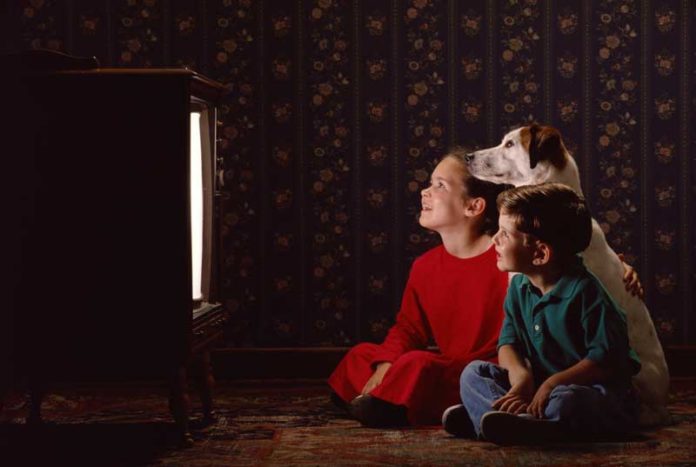You can’t swing a cat these days without hitting the latest iPad or iPhone. It seems like screens are truly everywhere, but despite all the new technology, the good old TV screen remains a favourite with kids – and they’re watching it more than ever. Unfortunately, as with many things kids love, TV is not all good. So what’s the screen doing to your little gremlin’s body and mind?
Is it really an idiot box?
We’ve probably all referred off-hand to the screen as the idiot box. Does it deserve this label? Yes and no. There are both good aspects and bad aspects to TV watching for children. Both the quality and quantity of TV your kids watch are important.
Most of the things we love should be consumed in moderation, and television is no exception. You don’t want to cut your children off from the world around us, but at the same time, too much television can give your kids the proverbial square eyes. Kids aged 6–11 nowadays spend an average of 25 hours watching television and DVDs – you don’t need to be Einstein to work out that’s too much!
Keeping kids busy
The quality of programs children watch is also important. It might seem obvious that children learn more from watching Sesame Street than reruns of Bold and the Beautiful. But if Sesame Street isn’t on when you’re busy making dinner (and need the box to keep your child busy and out of you hair) – well, what’s a parent supposed to do?
If developing your child’s mind is the goal, research suggests the best thing to do is turn the screen off until you have time to sit down and watch together. Send them outside for a run around with the kids up the road, give them a book, or get them to help you cook. These activities are more interactive than watching TV – they require kids to move around more, and process information and respond (rather than stare numbly). They give the brain (and body) a better workout than the TV.
Can TV rot your brain?
The old adage “TV rots your brain” may not be literally true, but there are certainly many bad health effects associated with overdoing the telly. For very small children, it can actually effect their brain development. Toddlers need interactivity (not one-way staring) to stimulate and grow their curious little brains. Research shows that playing games with or reading books to your children is far better for their growing minds.
So get them to switch off Buffy before it’s too late! Get a book into those grubby little hands!
What to be when I grow up?
We all want our children to grow up to be all they can, so keep in mind that over-exposure to the big, bad TV has been associated with risk-taking behaviour later in life. It’s little wonder when you think of how many programs glorify sex and drugs (and how many stunning characters walk away without experiencing the real consequences of their actions).
Some programs seem to send misguided messages to kids – for example, that they can have unprotected sex without getting pregnant, or take drugs without getting addicted. If kids see this happening time and again in TV shows, they may just begin to believe it and be more prone to taking drugs, smoking, gambling, borrowing money, over-eating or engaging in unsafe sex when they grow up.
Watching ‘icky’ shows or playing violent video games can also scare the living pants off children, especially if they’re very small. They might be too scared to go to bed, or wake up scared in the night to find their bed wet. Sleep disturbances are bad in themselves, but on top of that, growing brains need proper sleep to reach their full potential.
Quality TV: It takes two, baby
It’s clearly important to monitor not only how much TV your child watches, but also the content that they’re exposed to. And what better way to do that than by watching with them? You can check out what they’re watching and how much, engage in damage control if little Jeremy switches to a not-so-suitable program or sees an advertisement for True Blood, and you can help them interpret what they see. You might even encourage them to love shows with good role models – remember Astro Boy and Inspector Gadget saving the world?
But how?!
Some kids can be a handful, and often it can be hard to win an argument when the TV is involved and the Wiggles are pounding out their latest hit. So keep in mind a few tips to make this process a little easier:
- Wiggles in the bedroom! In fact, no TVs. This way, kids will know that bedtime means bedtime, not screen time.
- Set TV time limits and stick to them. It’s a little easier if you discuss it in advance.
- Know what their favourite programs are and make sure they don’t get stuck into something inappropriate, like Californication or Dexter!
- Watch their shows with them, so you can talk to them about anything they don’t understand (or flick the remote if naughty stuff comes on).
- Don’t use the TV as a reward for good behaviour – for their whole life, TV will be associated with being good, rather than reading books or going to the beach and being active.
Then why turn it on at all?
It’s really not all doom and gloom. TV can be a useful educational tool, especially if you’re putting on documentary DVDs or films with great messages for children. Keep it positive and light, and you won’t have wet beds after an episode of CSI. Look for shows you can watch together that promote good behaviour; this way, you can also bond with your child. Talk about what you watch, too. This will make the experience more interactive.
TV or not TV?
Because TV is so powerful, you can also use it to your advantage and to your children’s advantage. Choose quality programs which expand their minds and make sure they only spend as much time as you’ve got to sit with them in front of the screen. Oh, and remember to tell them to run around outside once in a while – this way, we won’t raise a generation of screen fiends!
More information
 |
For more information, see TV and Child Development. |



 (10 votes, average: 4.60 out of 5)
(10 votes, average: 4.60 out of 5) 






